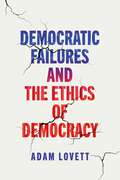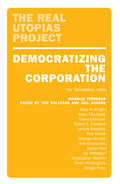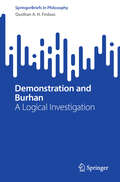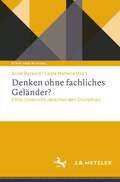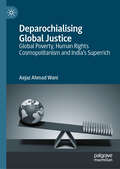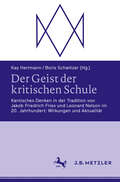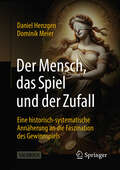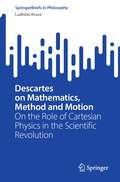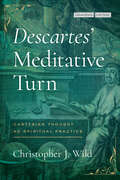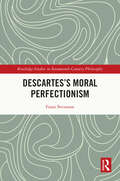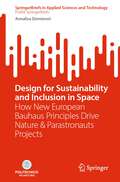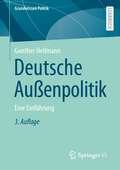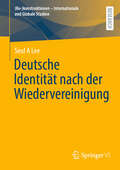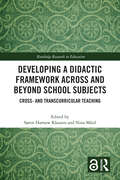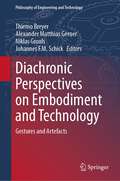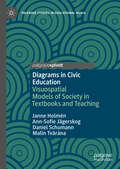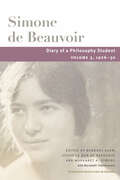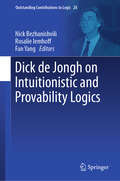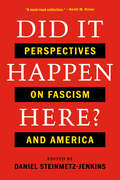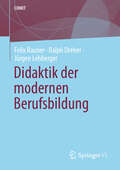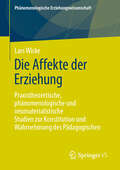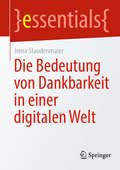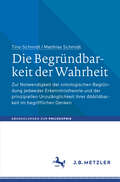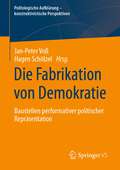- Table View
- List View
Democratic Failures and the Ethics of Democracy (Democracy, Citizenship, and Constitutionalism)
by Adam LovettIn Democratic Failures and the Ethics of Democracy, political philosopher Adam Lovett argues that when it comes to democratic ideals, the United States is a failed democracy. Specifically, he contends that American democracy has failed to advance equality and self-rule for its citizens—qualities he identifies as essential components of democracy’s intrinsic value. Drawing on rich empirical research, Lovett applies original philosophical analysis to reveal real-world democratic failures and evaluate their philosophical and ethical consequences.His research locates democratic failures at both the level of political elites and at the level of the masses. At the elite level, elected officials shape policy to prioritize the interests of their supporters, where wealthy individuals and corporations are the most influential. At the mass level, ordinary citizens are motivated to vote not to introduce specific policies but by party identification. By mapping how these failures erode equality and self-rule, he demonstrates that they in fact undermine the ethics of democracy itself. After all, Lovett argues, when a state fails to represent ordinary citizens, those ordinary citizens are not morally obligated to follow the laws of the state.Because the state fails to achieve democratic values in any meaningful way, its claim to political authority and legitimacy is diminished. However, Lovett does not conclude that American democracy is doomed—he instead proposes solutions from voting only on referendums to delegating aspects of public policy to unelected experts without partisan obligation. These reforms are vital for compelling the state to act on behalf of all citizens, not just the partisan or the powerful. Of interest to political scientists and political philosophers alike, Democratic Failures and the Ethics of Democracy sheds light on an increasingly troubled democratic ethos and proposes solutions for how ordinary citizens can work to save it.
Democratizing the Corporation: The Bicameral Firm and Beyond
by Joel Rogers Isabelle Ferreras Tom MallesonWorker representation is the first step toward democratizing the economyAlthough contemporary Western societies refer to themselves as &“democratic,&” the bulk of the population spend much of their lives in workplaces that have more in common with tyranny. Gigantic corporations such as Amazon, Meta, Exxon, and Walmart are among the richest and most powerful institutions in the world yet accountable to no one but their shareholders. The undemocratic nature of conventional firms generates profound problems across society, hurting more than just the workplace and contributing to environmental destruction and spiraling inequality.Against this backdrop, Isabelle Ferreras proposes a radical but realistic plan to democratize the private firm. She suggests that all large firms should be bicamerally governed, with a chamber of worker representatives sharing equal governance power with the standard board representing owners. In response to this proposal, twelve leading experts on corporate behavior from multiple disciplines consider its attractiveness, viability, and achievability as a &“real utopian&” proposal to strengthen democracy in our time.
Demonstration and Burhan: A Logical Investigation (SpringerBriefs in Philosophy)
by Qusthan A. FirdausThis book investigates the historical development of Aristotle’s perfect syllogism, or demonstration, into the Muslim world. It provides an accessible account to the modern reader, while at the same time bringing to the discussion the important issue of the specifically Muslim contribution to the field of logic. The author emphasizes the importance of axioms in establishing demonstration and the modern logic of dialetheia - Graham Priest’s idea of some true contradictions - in Islamic discourses. While Muslim philosophers have been claiming that demonstration is equal to burhan in mantiq or logic in Islamic education, this book presents the fact that burhan sets aside the necessity of axioms, making the former seem to be a deviation from Aristotle’s demonstration. The variety of Islamic philosophies has not been adequate enough to develop logic in Islamic education as progressive as its European counterparts. This book is an invitation to students and researchers to reconsider mantiq or logic in Islamic education based upon the Aristotelian logic and the modern logic of dialetheia, given that one cannot comprehend various Islamic discourses simply by exercising the Aristotelian principles of identity, non-contradiction, and excluded middle. In providing a useful overview of Aristotle before launching into a discussion on the various positions that Muslim scholars take regarding demonstration, the author presents a better framework for scholars and students in philosophy and religious studies to grasp several controversial and peculiar ideas in Islam.
Denken ohne fachliches Geländer?: Ethik-Unterricht zwischen den Disziplinen (Ethik und Bildung)
by Laura Martena Anne BurkardDie meisten Ethik-Fächer in Deutschland sind als Alternativ- oder Ersatzfächer für den Religionsunterricht konzipiert. Eine Herausforderung betrifft die Verortung eines Teils dieser Fächer zwischen Philosophie, Religionswissenschaft und weiteren Disziplinen. Am Beispiel des Faches Werte und Normen diskutiert dieser Band Fragen, die sich für alle multidisziplinären Ethik-Fächer stellen: Was bedeutet es für die Konzeption, die Unterrichtspraxis und die Lehrkräftebildung eines Faches, wenn es an mehreren Bezugsdisziplinen ausgerichtet ist? Wie sollten die Bezüge verbunden oder abgegrenzt werden? Welche Konzepte für die Fachentwicklung gibt es?
Deparochialising Global Justice: Global Poverty, Human Rights Cosmopolitanism and India’s Superrich
by Aejaz Ahmad WaniThis book offers a deparochial account of global justice and addresses disenchantment stemming from its West-centricity and provincial theoretical formulations. As the recurring global poverty debate restricts the duties of alleviating poverty and inequality to the developed world, this book attempts to broaden the spectrum of duties to the superrich of the developing world. Drawing from the case study of India’s superrich as an exemplar of the potent agency of rising powers, the book examines the structural relationship between unbridled affluence and the (un)realisation of the human rights of the poor. It contends that India’s superrich, like their counterparts in other powerful developing countries, both contribute as well as benefit from the highly decentralised global economic order that (re)produces affluence of the few and deprivation of the many within these countries. In doing so, this book argues that the superrich have a positive duty to alleviate poverty and reduce inequality beyond their free-standing moral responsibility for philanthropy.
Der Geist der kritischen Schule: Kantisches Denken in der Tradition von Jakob Friedrich Fries und Leonard Nelson im 20. Jahrhundert: Wirkungen und Aktualität
by Kay Herrmann Boris SchwitzerPhilosophie als Wissenschaft, als Grundlagendisziplin und als interdisziplinäre Forschung: Ansätze, die sich eine zu Unrecht fast vergessene philosophische Schule zu eigen gemacht hat, nämlich die 1903 neu gegründete Fries’sche Schule um den Göttinger Philosophen Leonard Nelson (1882-1927). Sie steht in der Tradition der Philosophie Immanuel Kants (1724-1804) und Jakob Friedrich Fries' (1773-1843). Der Nelsonkreis hält dem Vergleich mit dem Wiener Kreis stand. Die Anhänger des Nelsonkreises kamen u.a. aus der Mathematik, Physik, Philosophie, Psychologie, Theologie und den Sozial- und Wirtschaftswissenschaften. Über sie wirkte die kantisch-friessche Philosophie teilweise in andere Disziplinen hinein. Zu nennen sind beispielsweise der Psychiater und Psychologe Arthur Kronfeld (1846-1941), der Biochemiker und Nobelpreisträger Otto Meyerhof (1884-1951), der Mathematiker Gerhard Hessenberg (1874-1925), die Philosophin und Physikerin Grete Henry-Hermann (1901-1984), die Pädagogin MinnaSpecht (1879-1961), der Wirtschaftswissenschaftler Alexander Rüstow (1885-1963), der Theologe Rudolf Otto (1869-1937), der Soziologe Franz Oppenheimer (1864-1943) und der Sozialwissenschaftler Gerhard Weisser (1898-1989).Die Ausstrahlung des Nelsonkreises auf verschiedene Disziplinen sowie dessen Geschichte sind bislang noch nicht umfassend untersucht worden. Diese Forschungslücke soll mit dem vorliegenden Band geschlossen werden. Der systematische Forschungsband bietet zudem eine Einführung und einen Überblick zur Philosophie Leonard Nelsons.
Der Mensch, das Spiel und der Zufall: Eine historisch-systematische Annäherung an die Faszination des Gewinnspiels
by Dominik Meier Daniel HenzgenDas vorliegende Buch Der Mensch, das Spiel und der Zufall bietet eine historisch-systematische Analyse des Gewinnspiels und seines ewigen Reizes für uns Menschen. Aufbauend auf Erkenntnissen der Geschichtswissenschaft, Philosophie, Ökonomie, Statistik und Psychologie, ergründet es die Faszination des spielerischen Ringens mit dem Zufall – und warum Gewinnspiele seit jeher ein Kampfplatz von Ideologien, Moralvorstellungen, Lebenskonzeptionen und Machtinteressen sind. Der Band setzt einen Denkanstoß für jeden, der sich privat oder beruflich mit Gewinnspielen beschäftigt oder einfach von diesem weiten Feld fasziniert ist. Die Abhandlung bietet strategisches Orientierungswissen zur weiteren Meinungsbildung und versteht sich als Grundlagenwerk, das ein breites Publikum aus Wissenschaft, Wirtschaft, Gesellschaft und Politik zum Nachdenken anregen soll.
Derrida and Inheritance in Environmental Ethics: The Half-Lives of Responsibility
by Michael PetersonThis book argues for the necessity of a re-evaluation of our thinking about responsibly relating to future generations in the context of environmental philosophy. Using long-term nuclear waste disposal as its paradigmatic case, this book makes the case that the predominant mode of thinking the future in terms of continuity and repetition of the present requires a critique informed by French philosopher Jacques Derrida in order to think responsibility adequately. The book begins by surveying contemporary accounts of intergenerational responsibility before outlining the specifics of nuclear waste disposal policy. With these stakes established, the contributions of Jacques Derrida to future-oriented ethics are introduced. These include discussions of communication across contexts, the relationship between inheritance and responsibility, and the political imperatives that result from this critique. This book concludes by arguing for an intergenerational environmental policy that rejects policy and infrastructural projects that depend on the present reproducing itself indefinitely.
Descartes on Mathematics, Method and Motion: On the Role of Cartesian Physics in the Scientific Revolution (SpringerBriefs in Philosophy)
by Ladislav KvaszThis book argues that Descartes’ physics was a milestone on the road to modern mathematical physics. After Newton introduced a completely different approach to mathematical description of motion, Descartes’ physics became obsolete and even difficult to comprehend. This text follows the language of Descartes and the means of which motion can be described. It argues that Descartes achieved almost everything that later Newton was able to do—to describe the motion of interacting bodies- by different (i.e. algebraic) means. This volume completely refutes the received view according to which Descartes’ physics was merely a kind of discursive natural philosophy. To make this interpretation more plausible the book follows Descartes’ ideas from his early work in mathematics, through his invention of the analytic method towards his mature physics. It shows that Descartes followed a similar heuristic pattern.The volume appeals to students and researchers; it invites the reader equippedwith minimal understanding of college mathematics to follow Descartes on his intellectual journey through the Scientific Revolution. The reader will gain a deeper understanding of the role of mathematical language in the creation of modern physics and a glimpse into the fascinating world of Descartes’ scientific thought. Several of Descartes’ philosophical ideas can be traced back to his scientific interests and thus the book elucidates the motivation behind some of Descartes’ key positions in the area of epistemology and method. In the penultimate chapter the book presents four arguments in favor of seeing Descartes as a physicist on par with Galileo and Newton.
Descartes’ Meditative Turn: Cartesian Thought as Spiritual Practice (Cultural Memory in the Present)
by Christopher J. WildWhy would René Descartes, the father of modern rationalist philosophy, choose "meditations"—a term and genre associated with religious discourse and practice—for the title of his magnum opus that lays the metaphysical foundations for his reform of all knowledge, including mathematics and sciences? Why did he believe that the immortality of the soul and the existence of God, which the Meditations on First Philosophy set out to demonstrate, can only be made self-evident through meditating? These are the question that Christopher Wild's book answers. Descartes discovered the "foundations of a marvelous science" through a dramatic conversion in southern Germany in the winter of 1619. The spiritual and cognitive exercises, derived from ancient philosophy and the Christian meditative tradition, which Descartes deployed in the Meditations, enable readers to discover metaphysical truths with the same degree of self-evidence with which Descartes did during his own conversion. Descartes' meditative turn, Wild argues, brings to a culmination a lifelong preoccupation with the practice or craft of thinking, known as Cartesian method. By joining meditation to method the Meditations becomes the founding document for a Cartesian "art of turning," a new practice of both thought and life.
Descartes’s Moral Perfectionism (Routledge Studies in Seventeenth-Century Philosophy)
by Frans SvenssonThis book offers a novel and comprehensive interpretation of Descartes’s moral philosophy. In contrast to other influential interpretations, the book argues that the central tenet of his ethical thought is that each person ought to live in the way that is most conducive to their degree of overall perfection.While Descartes’s ethical thought has attracted only a very modest amount of attention among scholars, this book demonstrates that it constitutes an important and integral component of his philosophical project as a whole. It argues that Descartes’s ethics constitutes a form of moral perfectionism. In the Cartesian picture, we satisfy this requirement of perfection by using our free will well in all our conduct, something which is also necessary for obtaining happiness for ourselves. To be guaranteed happiness, however, we need to acquire the virtue of generosity, which, besides a habit of using one’s free will well, entails a habit of being attentive in one’s thought to various truths about oneself and about the world we live in. Descartes offers an interesting attempt to make living well depend entirely on ourselves and not on fate or fortune. He also leaves room for the presence of passions within such a life and for acknowledging that even fully virtuous persons’ lives may differ in their degrees of overall perfection.Descartes’s Moral Perfectionism will appeal to scholars and graduate students working on Descartes, the history of early modern philosophy, and the history of ethics.
Design for Sustainability and Inclusion in Space: How New European Bauhaus Principles Drive Nature & Parastronauts Projects (SpringerBriefs in Applied Sciences and Technology)
by Annalisa DominoniThis book offers a cutting-edge perspective of design for space to increase astronauts’ wellbeing and performance creating a more sustainable and inclusive environment, but without to forget beauty. The relevant aspect is that these design principles are now also supported and promoted by the European Community with the New European Bauhaus project. It is legitimate to affirm that Space Design is a precursor and inspiring these principles. Space exploration has shown us how results of space research inspire management policies addressing important earth issues such as the responsible use of resources as well as ethical behavior leading to sustainable and inclusive choices. The International Space Station (ISS) is the most successful virtuous example of circular economy and sustainability by almost totally recycling the waste produced. Recently the European Space Agency (ESA) launched the first call for “parastronauts” opening the fly possibilities to people with physical disabilities and thus affirming the principle of inclusion in space. Thanks to design—a bridge between science, technology, and beauty—space opens up to new creative experiments, placing the human being at the center of the interplanetary exploration programs to ensure extra-terrestrial habitats safer, more comfortable, and efficient, where crew will feel “like at home”.
Deutsche Außenpolitik: Eine Einführung (Grundwissen Politik)
by Gunther HellmannDer Schwerpunkt liegt auf einer problemorientierten Einführung anhand gängiger theoretischer und methodischer Instrumentarien, wie sie in der Außenpolitikanalyse zur Anwendung kommen. Die Leser*innen sollen mit unterschiedlichen Herangehensweisen vertraut gemacht werden, damit sie die Zusammenhänge zwischen theoretischen Perspektiven und entsprechenden Forschungsmethoden auf der einen Seite und konkreten Gegenständen der empirischen Analyse deutscher Außenpolitik auf der anderen Seite besser verstehen und dabei sowohl die Chancen wie auch die Grenzen der jeweiligen Perspektiven erkennen lernen.
Deutsche Identität nach der Wiedervereinigung ((Re-)konstruktionen - Internationale und Globale Studien)
by Seul A LeeIn diesem Buch wird die Frage zur nationalen Identität Deutschlands, die in der deutschen Gesellschaft selbst und von Nachbarländern immer wieder zur Debatte steht, im europäischen Sicherheitskontext behandelt. Daher fängt diese Forschung mit der „deutschen Frage“ an. Um diese Identitätsfrage im Sicherheitskontext zu analysieren, wird in der Forschung das Analysemodell von der Kopenhagener Schule (s.g. Securitisation Modell) angewendet. Das Modell gibt eine Erklärung zur Frage, wie ein bestimmtes Thema in einer Gesellschaft als Sicherheitsfrage dargestellt werden kann. Hierbei fokussiert sich die Kopenhagener Schule auf die Sprechhandlung der Akteure. In diesem Band wird die Sprechhandlung des Identitätsbildungsprozesses mit den ausgewählten politischen Reden, u. a. Weihnachts- bzw. Neujahrsansprache, sowie die Reden beim Jahresempfang mit den Diplomaten, von den Bundespräsidenten und -kanzler*innen zwischen 1989/1990 – 2020 analysiert.
Developing a Didactic Framework Across and Beyond School Subjects: Cross- and Transcurricular Teaching (Routledge Research in Education)
by Søren Harnow Klausen Nina MårdCentered around a contemporary conception of Bildung, this book effectively demonstrates how the aims of cross- and transcurricular teaching can be reconciled, resulting in a didactic framework for teaching and learning in secondary schools that can be applied internationally. Chapters present a nuanced and unified approach to fusing theory and practice by offering accounts of some of the most promising teaching methods from leading scholars in the field of curriculum research. These methods include dialogic teaching or movement integration, transversal competences like digital or entrepreneurial thinking, and topics that call for crosscurricular approaches, like sustainability or citizenship. Addressing diverse worries and criticisms of crosscurricular teaching, the book includes international viewpoints and trends such as sustainability, citizenship, and student motivation to present a comprehensive and systematic scholarly treatment of crosscurricular didactics within the classroom. It further addresses important challenges that have been widely ignored, like how to evaluate crosscurricular work. Ultimately, this volume makes a highly novel contribution to the field of crosscurricular didactics, and will be of interest to researchers, scholars, and academics in the fields of secondary education teaching and learning, educational science, and curriculum design. Those interested more broadly in the theory of education will also find the volume of use. The Open Access version of this book, available at www.taylorfrancis.com, has been made available under a Creative Commons Attribution- Non Commercial-No Derivatives (CC-BY-NC-ND) 4.0 license.
Diachronic Perspectives on Embodiment and Technology: Gestures and Artefacts (Philosophy of Engineering and Technology #46)
by Thiemo Breyer Johannes F. M. Schick Alexander Matthias Gerner Niklas GroulsThis book investigates the relationships between gestures and artefacts theoretically and historically, by analyzing different phenomena stemming from a variety of fields such as robotics, archaeology, gesture studies, anthropology, philosophy, and gestural practices like choreography, music performance, and composition. It underlines how embodiment and technology change the interplay between maker and artefact over time and appeals to students and researchers in these fields. Its goal is to enable the reader to understand that the recurring topics and questions as well as multi-level similarities are by no means accidental, but can best be understood if one pays attention to the intertwinements of materiality and cognition, praxis and techne.
Diagrams in Civic Education: Visuospatial Models of Society in Textbooks and Teaching (Palgrave Studies in Educational Media)
by Janne Holmén Daniel Schumann Ann-Sofie Jägerskog Malin TvärånaThis book presents the findings of three studies on the use of diagrams in civic education. The first study presents an international comparison of textbook diagrams promoting national unity in diversity, with examples from ten countries. The second focuses on the depiction of migration in diagrammatic form in German textbooks, The final study was conducted in collaboration with teachers in Swedish social science classrooms, and focuses on teaching comprehension of flow charts and scatterplots. The book will be of interest to scholars of educational media, didactics, the history of education and citizenship education.
Diary of a Philosophy Student: Volume 3, 1926-30 (Beauvoir Series #3)
by Simone de BeauvoirWritten between the age of eighteen and twenty-one, the entries in the third volume of Diary of a Philosophy Student take readers into Simone de Beauvoir’s thoughts while illuminating the people and ideas swirling around her. The pages offer rare insights into Beauvoir’s intellectual development; her early experiences with love, desire, and freedom; and relationships with friends like Élisabeth “Zaza” Lacoin, and Maurice Merleau-Ponty. It also presents Beauvoir’s shocking account of Jean-Paul Sartre’s sexual assault of her during their first sexual encounter--a revelation certain to transform views of her life and philosophy. In addition, the editors include a wealth of important supplementary material. Barbara Klaw provides a detailed consideration of the Diary’s role in the development of Beauvoir’s writing style by exploring her use of metanarrative and other literary techniques, part of a process of literary creation that saw Beauvoir use the notebooks to cultivate her talent. Margaret A. Simons’s essay places the assault by Sartre within an appraisal of Beauvoir’s complicated legacy for #MeToo while suggesting readers engage with the diary through the lens of trauma.
Dick de Jongh on Intuitionistic and Provability Logics (Outstanding Contributions to Logic #28)
by Fan Yang Rosalie Iemhoff Nick BezhanishviliThis book is dedicated to Dick de Jongh’s contributions to the theory of intuitionistic and provability logics. Consisting of 13 chapters, written by leading experts, this book discusses de Jongh’s original contributions and consequent developments that have helped to shape these fields. The book begins with an autobiographic note by Dick de Jongh, which discusses the main themes of his work and places the other contributions in context. The next four chapters explore the De Jongh-Sambin fixed point theorem and other contributions to provability and interpretability logics. The following four chapters focus on modal, intuitionistic and intuitionistic modal logics. They discuss independence of formulas, unification and de Jongh formulas in intuitionistic and modal logics. Then there follow two chapters on the other two areas to which Dick de Jongh made important contributions: the theory of well-partial orders, and formal learning theory. The second to last chapter on Origami Geometry can be seen as representing the Master of Logic program of the Institute for Logic, Language and Computation (ILLC) in which de Jongh invested a lot of energy. The book ends with a complete bibliography of Dick de Jongh in the last chapter. This volume provides a vital overview – and continuation of - de Jongh’s prolfic work in the theory of intuitionistic and provability logics.
Did It Happen Here?: Perspectives on Fascism and America
by Daniel Steinmetz-JenkinsAn essential primer for the thoughtful citizen. Since the election of Donald Trump, politicians, historians, intellectuals, and media pundits have been faced with a startling and urgent question: Are we threatened by fascism? Some see striking connections between our current moment and the tumultuous interwar period in Europe. But others question if these connections really reflect our current political moment or if they are another example of Eurocentrism and American provincialism speaking over a much more complex global political landscape.? Did It Happen Here? collects, in one place, key texts from the sharpest minds in politics, history, and the academy beginning with classic pieces by Hannah Arendt, Angela Davis, Reinhold Niebuhr, Leon Trotsky, and others. The book’s contemporary contributors include Ruth Ben-Ghiat on the trivialization of the term “fascism,” Jason Stanley and Sarah Churchwell on the Black radical perspective, and Robert O. Paxton on Trump. These writers argue firmly that fascism is alive and well in America today, but another set of contemporary voices disagree. Samuel Moyn demonstrates the limitations of historical comparison. Rebecca Panovka examines the uses and abuses of Hannah Arendt’s work. Anton Jager and Victoria De Grazia make the case that the social and communal conditions necessary for fascism do not exist in the United States. Still others, like Priya Satia and Pankaj Mishra, are critical of the narrow framework of this debate and argue for a global perspective. Did it Happen Here? brings together a range of brilliant intellectuals, offering vital takes on our evolving political landscape. The questions posed by editor Daniel Steinmetz-Jenkins is one that readers will be debating for decades to come. Is fascism significantly influencing—even threatening to dominate—modern American politics? Is it happening here?
Didaktik der modernen Berufsbildung (COMET)
by Felix Rauner Jürgen Lehberger Ralph DreherDie Didaktik der modernen Berufsbildung definiert als Bildungsziel die Förderung beruflicher Gestaltungskompetenz. Sie orientiert sich dabei an der KMK und deren Rahmenvereinbarung von 1991, in welcher die „Befähigung zur (Mit-)Gestaltung der Arbeitswelt und der Gesellschaft in sozialer und ökologischer Verantwortung“ als Ziel beruflicher Bildung formuliert wurde. Daran soll sich die Gestaltung, Organisation und Evaluation der beruflichen Bildung an beiden Lernorten unverändert orientieren. Diese Leitidee fordert die holistische (vollständige) Lösung beruflicher Aufgaben und zielt darauf ab, als Bildungsmoment jeweils lösungsrelevante Kriterien in ihrer Gewichtung und Konkretisierung gegeneinander abwägen zu müssen. Wir beschreiben in diesem Buch, wie es der Didaktik der modernen Berufsbildung gelingt, das Konzept der holistischen Aufgabenlösung auf der Ebene des Arbeitsprozesswissens durch drei aufeinander aufbauenden Wissensniveaus zu differenzieren: dem handlungsleitenden (Know That), handlungserklärendem (Know How) und dem handlungsreflektierendem Wissen (Know Why). Dazu beziehen wir uns auf die in einem internationalen Projekt entwickelte Methode der Kompetenzentwicklung und Kompetenzevaluation COMET. Durch die Fokussierung auf Gestaltungskompetenz und deren Messbarkeit über COMET erreicht die Didaktik der modernen Berufsbildung eine neue Qualität der Differenzierung ihrer Fragestellungen und Ergebnisse in ihrer Forschung und der Berufsbildungspraxis.
Die Affekte der Erziehung: Praxistheoretische, phänomenologische und neumaterialistische Studien zur Konstitution und Wahrnehmung des Pädagogischen (Phänomenologische Erziehungswissenschaft #15)
by Lars WickeEmotionen und Affekte spielen in der Erziehung eine zentrale Rolle. Allerdings wird dieser Zusammenhang bislang vor allem mithilfe psychologischer Ansätze beleuchtet. Dabei geraten soziale Dimensionen der Erziehung aus dem Blick. Dieses Buch fragt demgegenüber in Bezug auf praxistheoretische, phänomenologische und neumaterialistische Affektverständnisse nach der Konstitution und Wahrnehmung von Erziehung als einem sozialen Phänomen. Im Zentrum steht die These, dass Erziehung im dynamischen Zusammenwirken von Praktiken und Diskursen und in den Beziehungen zwischen menschlichen und nicht-menschlichen Körpern entsteht und vor dem Hintergrund der darin enthaltenen affektiven Dimensionen intelligibel wird. In der Interpretation von videografierten Szenen aus Kita, Schule und Universität werden Figuren des Affektiven ausgearbeitet, in denen jene Momente der Konstitution und der Wahrnehmung des Pädagogischen, auch in ihrer Untrennbarkeit voneinander, deutlich werden. Der Affektbezug erscheint dabei selbst als Methode und insofern als Bezugspunkt einer relationalen Theorie und Empirie des Pädagogischen.
Die Bedeutung von Dankbarkeit in einer digitalen Welt (essentials)
by Irena StaudenmaierDieses inspirierende Büchlein erinnert uns daran, warum es wichtig ist, inmitten der digitalen Revolution dankbar zu sein. Mit praktischen Übungen, inspirierenden Geschichten und einer ermutigenden Perspektive ist es eine wertvolle Ressource für jeden, der nach mehr Erfüllung und Zufriedenheit in einer digitalen Welt sucht. Es bietet einen einzigartigen Blickwinkel auf Dankbarkeit in einer digitalisierten Welt. Die Autorin unterstützt mit praktischen Ratschläge und Übungen, die helfen, die vorgestellten Konzepte im eigenen Leben anzuwenden.
Die Begründbarkeit der Wahrheit: Zur Notwendigkeit der ontologischen Begründung jedweder Erkenntnistheorie und der prinzipiellen Unzulänglichkeit ihrer Abbildbarkeit im begrifflichen Denken (Abhandlungen zur Philosophie)
by Matthias Schmidt Tino SchmidtAusgangspunkt dieses Buches ist die Frage, inwieweit Wissen objektiv begründbar ist und inwieweit unsere Aussagen in ihrem Anspruch als wahr zu gelten, einen Bezug zu einer unabhängig von unserem subjektiven Erleben gegebenen Welt notwendig voraussetzen müssen. Insgesamt soll gezeigt werden, dass erstens jeder Wahrheitstheorie korrespondenztheoretische Annahmen (d.h. Wahrheit ist Übereinstimmung einer Aussage bzw. eines Gedankens mit der Wirklichkeit) in irgendeiner Weise zugrundeliegen müssen. Zweitens dass jedoch jede Form der Korrespondenztheorie notwendig entweder zu in sich widersprüchlichen Systemen führt (v.a. Kant, Fichte, Hegel, Aristoteles und Popper) oder zu sich abkapselnden Doktrinen, die per se nicht falsifizierbar sind (Thomas von Aquin, die Stoiker, Platon, Wittgenstein, Habermas). Schlussfolgerung: Da jede Erkenntnistheorie korrespondenztheoretische Grundannahmen beinhalten muss (z.B. der ontologische Grundsatz einer Entsprechung von Sein und Bewusstsein), liegt in ihnen stets eine Erklärungslücke vor.
Die Fabrikation von Demokratie: Baustellen performativer politischer Repräsentation (Politologische Aufklärung – konstruktivistische Perspektiven)
by Hagen Schölzel Jan-Peter VoßDas Buch eröffnet ein neues Forschungsfeld praxeologischer Demokratieforschung. Statt von bestimmten theoretischen Konzeptionen auszugehen, was Demokratie ist oder sein soll, wird untersucht, wie Demokratie praktisch gemacht wird. Wie wird der „demos“ zum Subjekt des Regierens gemacht, als politischer Akteur mit kollektivem Willen und Handlungsmacht? Das Buch verfolgt den Ansatz, nach konkreten praktischen Formen zu suchen, in denen Repräsentationen des Willens von kollektiven Subjekten hergestellt und geltend gemacht werden. Dabei entfaltet sich ein Blick auf die Multiplizität und Dynamik der Demokratie.
